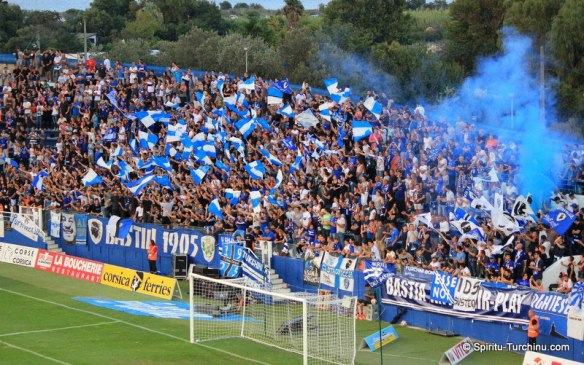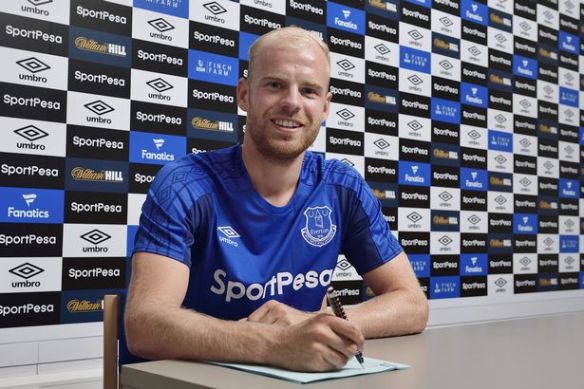The arrival of the world’s most expensive footballer in Paris last week generated worldwide headlines and drew the attention of football fans around the world to Ligue 1; but for fans on the island of Corsica the wealth being flouted in the Capital seemed like a distant world away.

At a reported €222 million, it is no wonder that Neymar Jnr’s transfer to Paris Saint-Germain is the most talked about story in football over the past few weeks. The player’s move from Barcelona to the French capital shattered the previous world record transfer fee by more than double and raised numerous questions that are sure to be answered over the coming season. Was it a move motivated by money, glory or both? How can such an inflated fee fit into UEFA’s Financial Fair Play policy? Does this mark the arrival of Ligue 1 as a top European league? While the majority of the mainstream sports press were fawning over answering these questions; the other end of football finance was rearing its head in the South of the country.
Corsica, for the uninitiated, is a small Mediterranean island that has a disputed history of Italian and French occupation, but in the heart of its people, is fiercely independent. It has four professional football clubs; two from each of its major cities, Bastia and Ajaccio; as well as a handful of semi-professional and amateur sides. Therefore despite its relatively small population it has a virulent footballing tradition. Of the four professional clubs, SC Bastia is the oldest and most successful, having won the French Cup in 1981, and reached the final of both the UEFA Cup (1978) and the Coupe De La Ligue (2015). The success and history of the club combined with the importance of football in the traditions of the Island mean that the impact of the events surrounding the club over the past few months will undoubtedly have a long-lasting and far-reaching impact.
In order to truly explain the situation it is worth going back to May. The final match day of last season’s Ligue 1 saw SC Bastia travel to a revitalised Marseille needing three points to ensure their survival. It had been a torrid season for Corsica’s highest ranked professional club; marred by on and off pitch controversy (an earlier match against Local rivals Lyon had been abandoned due to crowd trouble and controversially awarded to Lyon; while a season-long fire sale of players had incited rumours of the board’s financial imprudence). Needless to say, despite a valiant effort, Bastia lost 1-0 consigning them to Ligue 2 for the first time in four years. As anyone who loves a football club knows relegation is in itself a hard enough prospect to endure, yet this was not the end of the trouble for SCB.
The French Football Federation has its own financial watchdog, Direction Nationale du Contrôle de Gestion (DNCG), which monitors the financial situations of the country’s professional clubs. Though undoubtedly an invaluable tool, the DNCG has a reputation among fans for acting too late and then handing out extreme punishments to further compound financial struggles (see the story of Le Mans). The DNCG provisionally relegated both SC Bastia and neighbours, AC Ajaccio (ACA), to the National League in mid-June, due to financial discrepancies involving the budget of both clubs. It is worth noting at this point that the DNCG had investigated both clubs the previous summer, but had decided to not take any action. The decision of Mid-June was subject to appeal for both clubs, however where neighbours ACA were able to convince the DNCG that their issues were solvable, the decision regarding SC Bastia was upheld at the end of June. The former Ligue 1 outfit now faced starting the new season in the National League. However by early July it was clear that the financial situation at the club was far worse than initially feared.
It soon came to light that the club had over €20 million of unanswerable debts, and was on the verge of bankruptcy. In a meeting on 4th August, the ownership group of the club met with the fans association, Socios Etoile Club Bastiais, to announce that the club was filing for bankruptcy and that the ownership group would leave the club with immediate effect. The filing for bankruptcy meant that the French Football Federation had to withdraw the club’s professional status and SC Bastia would be starting the new season as an amateur team in the National 3 Corse-Mediterranean League. A demotion of considerable proportions, the closest real-life parallel in British footballing terms would be what happened to Rangers in 2012, though in reality it is more akin to Bournemouth being relegated from the Premiership and starting the new season in the Evo-Stick Southern Division!
The immediate consequence of the loss of professional status was that all remaining players had to be sold, including loyal stalwarts such as Captain Yannick Cahuzac, who had initially expressed his desire to stay with the club in the National League. More concerning than all of the issues in footballing terms is the wide-reaching impact for the wider community, and Corsica as a whole. Over 100 employees of the club instantly lost their jobs, and suppliers to the club will have millions of euros of losses as a result of the club being unable to pay outstanding bills. Many of the club’s suppliers are local; something that the professional club took great pride in. Understandably the wider community are both fearful and angry. Pierre-Noel Luigi, CEO of Oscaro, the local car parts firm and main sponsor of SCB has been particularly vocal in his criticism of the previous ownership group as well as the DNCG, bringing particularly vitriolic scorn towards ex-club president, Mr Geronimi, who he described as deceptively flamboyant. In the eyes of many including Mr Luigi, the DNCG acted too late, and could have done more sooner, particularly as they were aware of financial discrepancies the previous summer.
It looks as though the historic club may survive in a reduced form. The fan’s group, SECB have mobilised launching a crowdfunding campaign to raise funds to monitor and support any new ownership attempts, as well as taking responsibility for the day to day management of the club while new owners are lined up. There has been some indication of a possible takeover by a consortium represented by Corsican native Jean Dominici, though the latest talk coming from their camp suggests that the group would be unable to cover the remaining debts. Though the immediate future looks bleak for SCB, the objectives and aims of the SECB are determined and focused to ensure that the reborn club is ethical and well managed, as well as focused on the development of Corsican Youth. Fans of SC Bastia should take some hope from the rise of Strasbourg, a club that found themselves in a not too dissimilar position not so long ago, who have recently retaken their place in the French top flight. However, for the meantime at least, SC Bastia will be playing amateur football next season.
While the world focuses on the wealth in the French capital, it is worth sparing a thought for SC Bastia and Corsica itself. Though undoubtedly their dire financial situation is down to the club’s own mismanagement, it does raise questions about the effectiveness of the DCNG and about the distribution of wealth in professional football. The coming months will be tough for SCB fans and for Corsica as a whole, particularly if AC Ajaccio are unable to keep the wolves from the door next summer.

